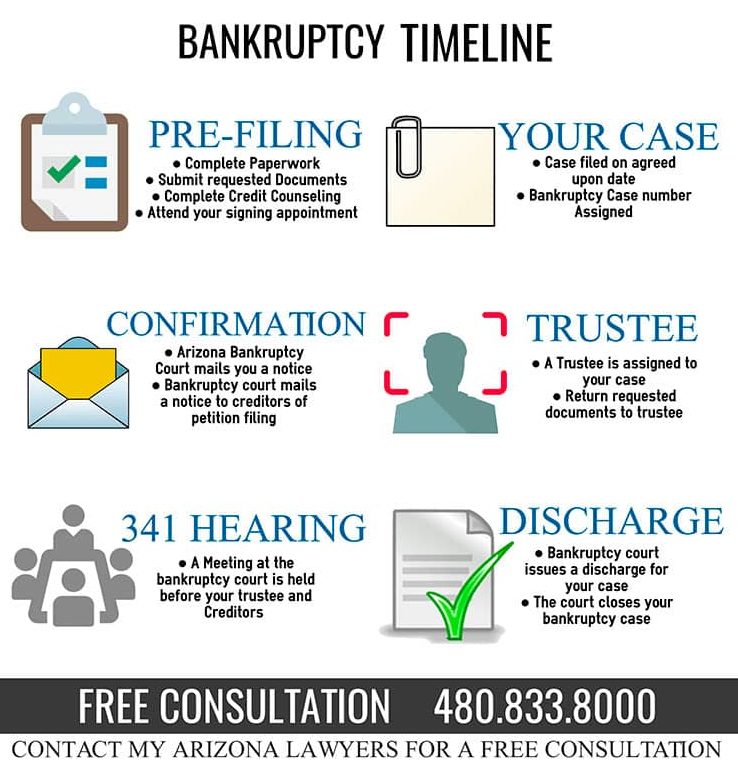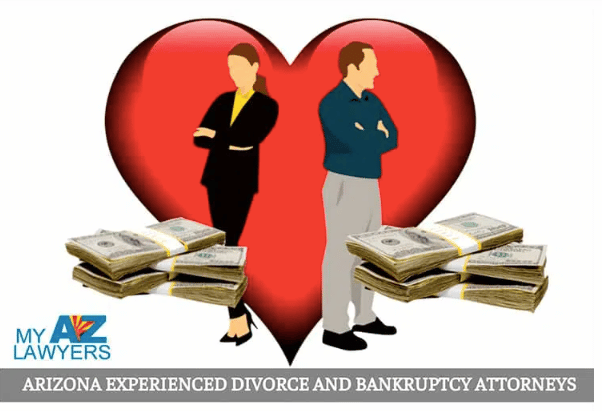
Should I file Bankruptcy before or after Divorce?
This will depend on a number of factors. If you are already separated and not able to maintain contact with your ex for documents such as pay stubs and tax returns, it will probably be easier to proceed with a bankruptcy after getting a divorce. It will be literally impossible to file a joint bankruptcy without interacting with your ex.
If you are on better terms with your ex, you may want to file jointly. Even if you incurred debts during the marriage in your name alone, they may still be considered community property. This means that both spouses could be held liable for the debt. If you wait until after the divorce to discharge your community property debts, you will each have to hire your attorney, pay the court filing fee separately, etc.
Does filing Bankruptcy stop Divorce proceedings?
When you file bankruptcy, an automatic stay of protection goes into effect, basically freezing your assets. This can delay the proceedings, and your divorce in general. For this reason, you should decide which case you want to file first, and complete the first case before you begin the second.
How long after Divorce can you file Bankruptcy?
There isn’t a waiting period for filing bankruptcy after you complete your divorce. However, you will have to provide divorce documents for your bankruptcy if you file your bankruptcy within 6 years of the divorce.
Should one or both spouses file Bankruptcy?
If the majority of the debts in question were incurred by one spouse before the marriage, it may be feasible for only one spouse to file bankruptcy. However, Arizona is a community property state. Most of the debts you incur during the marriage, regardless of whose name they are in, will be classified as community debts.
Something to keep in mind is that you won’t be able to get a home loan for two years after your bankruptcy. If one spouse would only be on the hook for a few thousand dollars’ worth of community debt, it may be worth assuming that debt if they want to buy a house soon.
Some of the advantages of filing bankruptcy first, such as saving money on attorney’s fees and filing costs, are listed above. Another advantage of filing bankruptcy is first is that some exemption amounts for your assets are higher when you are married. For example, in Arizona, a single bankruptcy filer is allowed to have up to $6,000 equity in a vehicle. Married filers may have two vehicles with $6,000 equity each, or one vehicle with $12,000. If your assets fall in the exemption amounts for married filers but not single filers, you may want to file your bankruptcy before your divorce.
Debts, like assets, can be used as bargaining chips during a divorce. For example, one spouse may agree to pay off a credit card in exchange for being able to keep a computer or bedroom set. If you complete your bankruptcy before your divorce, you will have less liabilities to argue over, and you won’t waste divorce attorney’s fees arguing over debts. If your ex is assigned a debt in the divorce but files bankruptcy, the creditor can still pursue you for the debt.
ARIZONA DIVORCE ATTORNEY
A Chapter 7 bankruptcy lasts 3-5 months, while a Chapter 13 bankruptcy lasts 3-5 years. If you are on the brink of divorce, completing a Chapter 7 bankruptcy is more feasible than a Chapter 13.
You may also have an easier time qualifying for a Chapter 7 bankruptcy after a divorce. In Arizona, the median income level for a single earner with no dependents is $51,388. If you make above that amount, you can only qualify for a Chapter 7 bankruptcy if you pass the means test. If you are married with no dependents, that amount only raises to $64,543 even if both of you are working. If you divorce first, you won’t have to count each other’s income.

Protecting both spouses during Divorce
5 things to know about Bankruptcy and Divorce
5. Some law firms are full service, meaning they handle bankruptcies and family law cases. If you are unsure which case to file first, you should contact a full service firm for a consultation. Our office offers free consultations, which we can also hold over the phone. Call today to schedule your free consultation, discuss your options, and learn about our affordable payment plan options.








